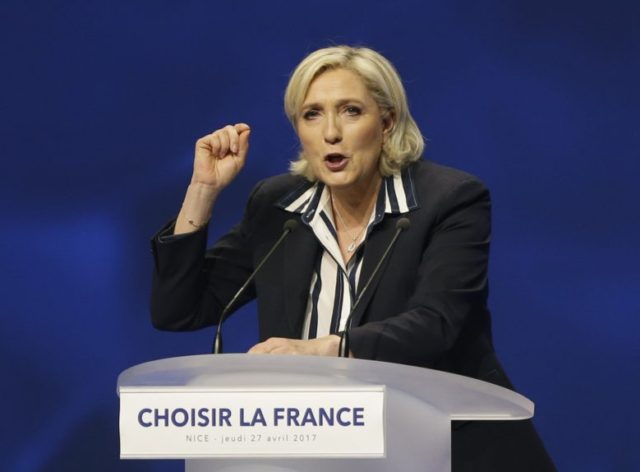This morning’s key headlines from GenerationalDynamics.com
- France’s presidential election in doubt because of abstainers
- France’s Eurosceptic Marine Le Pen starts to backtrack on euro policy
France’s presidential election in doubt because of abstainers

A youth kicks a teargas canister in Paris on Thursday during a protest against both Le Pen and Macron (AFP)
In the upcoming decisive May 7 final round of France’s election of a new president, Emmanuel Macron, the centrist 39-year-old former investment banker, is expected to beat 48-year-old far-right candidate Marine Le Pen by about 20 points, based on current polling. Mainstream media observers are hoping for an even bigger Le Pen defeat, which would be a repeat of the 2002 election.
When Marine Le Pen’s father, 73-year-old Jean-Marie Le Pen, then leader of the Front National, received 17% of the vote in first round of France’s presidential election on April 21, 2002, he knocked the former socialist prime minister, Lionel Jospin, out of the second-round runoff. This was such a shock to the French public, that all other parties and candidates rallied against Le Pen in what was called the “Republican front,” and gave the conservative candidate Jacques Chirac a massive victory with 82% of the vote. In other words, Le Pen did not get any additional votes in the second round than he did in the first.
Now Marine Le Pen has won 21.3% of the votes in the first round of France’s presidential election on April 23, 2017, knocking out the Republican, François Fillon, the Socialist, Benoît Hamon, and the far-left candidate, Jean-Luc Mélenchon. This sets up a two-way race between Marine Le Pen and Emmanuel Macron, the 39-year-old centrist who won 24% of the vote of the vote in the first round.
The question is: will another “Republican front” emerge in 2017, as it did in 2002? Will all other parties, candidates, and voters unanimously rally against Le Pen, in favor of Macron? We already know that is not going to happen.
First, Mélenchon is refusing to endorse either Le Pen or Macron. He announced to his supporters:
You don’t need me to tell you who to vote. I’m not a guru, not a guide.
After Marine Le Pen responded by saying that she would go after Mélenchon’s voters, Mélenchon’s spokesman Alexis Corbière said, “Not one vote should go to the National Front,” implying that Mélenchon really does support Macron. According to a poll, Mélenchon’s voters would break 40% for Macron and 19% for Le Pen – and 41% would abstain.
And that is the second major issue: the abstainers. Many college students are opposed to both Le Pen and Macron, and some are violently opposed, as shown on Thursday by several hundred school students who threw glasses and smoke bombs at police during a “Neither Marine, nor Macron” demonstration in Paris.
One 18-year-old girl told RFI:
I don’t want to choose between liberalism and fascism. Don’t need someone who worked for the bank, with his program he’s going to put France in the sh-t, but fascism isn’t the solution either. I don’t want to choose between two diseases.
Macron left investment banking and launched his political career as economy minister in the Socialist government of the current president, François Hollande. Macron quit Hollande’s government in August of last year and built up his own political following.
Both Macron and Le Pen have family issues. In 2007, Macron pursued and married a woman 25 years older, the now 64-year-old Brigitte Trogneux, a mother of three who left her husband for Macron. Le Pen is a twice-divorced mother of three.
What effects all this will have on the election results is anyone’s guess. As in the case of Donald Trump, the mainstream media are opposed to Le Pen to the point of incoherence, so it is impossible to figure out what is going on from media reports. AFP and Deutsche Welle and RFI
France’s Eurosceptic Marine Le Pen starts to backtrack on euro policy
Marine Le Pen has campaigned against immigration, Islam, globalism, NATO, the European Union, and the euro currency. She has advocated “Frexit,” by which she means that France should leave the eurozone and return to the French franc currency, and possibly leave the European Union altogether, just like Britain and Brexit. Many people fear that if she wins, then the entire European project will be in jeopardy.
However, there are two signs that those fears are overblown.
The first sign is that the European Union nations appear to have come together in greater unity as a result of the coming negotiations for Britain’s leaving the European Union, as we described yesterday.
The second reason is that Le Pen herself appears to be backtracking on her position on the euro. This would be similar to what has happened with Donald Trump, who backed off some of his extreme positions while the election campaign was still on, and has backed off further since becoming president.
Le Pen’s stated policy platforms in the past have included:
To support French companies in the face of unfair international competition through the implementation of intelligent protectionism and the restoration of a national currency adapted to our economy, the vehicle of our competitiveness…
Monetary and budgetary sovereignty, because there is no free-state without a currency, and then economic sovereignty, to be able to implement economic patriotism…
The euro is the currency of the bankers, not the people who have seen the decline of its purchasing power and mass unemployment.
Le Pen is now facing up to the reality that leaving the euro currency is one of the least popular of her policies, as most of her voter base is more concerned about immigration and Islam.
So last week, in an interview, she said:
This means converting the single currency into a common euro, a currency that will not affect daily purchases, but only large companies that trade internationally.
She’s also loosened her timetable. In the past, she promised a “Frexit” referendum within six months of taking office, but now she’s saying:
The transition from the single currency to the European common currency is not a pre-requisite of all economic policy, the timetable will adapt to the immediate priorities and challenges facing the French government.
Everything will be done to ensure an orderly transition… and the coordinated construction of the right for each country to control its own currency and its central bank.
So she is no longer talking about a referendum, and she is no longer talking about leaving the euro currency. As far as I can make out, she wants to have TWO euro currencies, one for international trade, and one for daily purposes. This is totally delusional, and appears to me to be to be a sign of desperation. Euro News and Reuters and Bloomberg
Related Articles
- European Union lays out demands for Britain over Brexit negotiations (30-Apr-2017)
- EU officials increasingly fear a Marine Le Pen upset victory in France’s elections (20-Apr-2017)
- Brexit: The die is cast, and the EU is playing hardball (31-Mar-2017)
- France heads for chaos in Sunday’s first round election for President (22-Apr-2007)
- Sarkozy begins term as activist President of France (19-May-2007)
- Tony Blair: We need jobs, not subsidies for cows (24-Jun-2005)
KEYS: Generational Dynamics, France, Marine Le Pen, Emmanuel Macron, Jean-Marie Le Pen, Front National, Jacques Chirac, Jean-Luc Mélenchon, Brexit, Frexit
Permanent web link to this article
Receive daily World View columns by e-mail

COMMENTS
Please let us know if you're having issues with commenting.